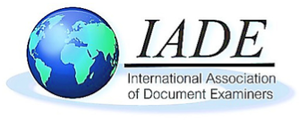Frequently Asked Questions
What does the word “forensic” mean?
The word “forensic” means the application of science to law, relating to or dealing with the application of scientific knowledge, methods, and techniques to an investigation.
What are forensic document examiners and what do they do?
A forensic document examiner, also known as a questioned document examiner is a person trained to study documents or other materials containing handwriting, typewriting, or printing.
They analyze, compare, and examine documents in order to determine the authenticity or non-genuineness of the document in question. They draw conclusions about signature and or handwriting identification, alterations, erasures, indented writing, sequence of writing, and any other problem that may challenge the legitimacy of a document. At times they testify in a court of law as an expert witness.
They analyze, compare, and examine documents in order to determine the authenticity or non-genuineness of the document in question. They draw conclusions about signature and or handwriting identification, alterations, erasures, indented writing, sequence of writing, and any other problem that may challenge the legitimacy of a document. At times they testify in a court of law as an expert witness.
What is a handwriting expert?
A handwriting expert analyzes, compares, and examines handwriting in order to determine the authenticity or non-genuineness of the writing that is in question and identify or eliminate a person as an author. At times they testify in a court of law as an expert witness.
What is an expert witness?
An expert witness is a person who possesses special knowledge or proficiency in a particular field that is relevant to a legal matter and therefore permitted to testify at a trial.
What are exemplars and what are they used for?
An exemplar is a handwriting sample that is known to be genuine. Documents that are generally accepted as genuine by the courts are those where a person admits to writing it, or by a witness who saw the person writing it or heard the person acknowledge his writing, or those documents executed during the normal course of business. An exemplar is also called a standard.
Exemplars are compared to questioned material in order to determine the authenticity or non-genuineness of a writing.
Exemplars are compared to questioned material in order to determine the authenticity or non-genuineness of a writing.
How many exemplars are needed and is there a time limitation?
Generally, when working with signatures, a document examiner will ask for 20-25 samples. When working with handwriting, a document examiner will ask for 4-5 pages of writing. Working with less is acceptable when what is generally asked for is difficult to obtain. All cases are different. What is important, is that the document examiner has a sufficient amount of samples for comparison to make a determination.
It is preferred to have material for comparison within a time span ranging from 2 years prior to and 2 years after the date of the questioned material. However, material ranging beyond that span can be used.
It is preferred to have material for comparison within a time span ranging from 2 years prior to and 2 years after the date of the questioned material. However, material ranging beyond that span can be used.
What is a forgery?
A forgery is an imitation or alteration of a document, handwriting, or signature being represented as an original with the intent to defraud causing harm or deceitfulness to another.
Do I have to have original documents?
Original documents are always preferred. If they do not exist copies can be used.
What is the time frame to get an opinion?
It will depend on the case load that we have at any given time. In most cases a report can be done within 7 – 10 days.
Will I get a written report of the opinion?
A verbal opinion will always be given first. Upon request, a written report will be done.
Will your opinion be accepted in a court of law?
Document examiners have to be “qualified”, having their qualifications accepted by a judge, each time they go to court. Once a document examiner is qualified, their opinion is accepted.
What certification should a document examiner have in order to testify in court?
A document examiner does not need to be certified. What is important to know is that under Federal Rule 702 Testimony of an Expert Witness, it is up to the judge to determine if a witness is qualified as an expert and may give court testimony in the form of an opinion. A witness may be qualified if they can demonstrate to the judge that they have the skill, knowledge, experience, education, or training in their field. The judge will make that decision based solely upon the experience and credentials of the document examiner.
However, certification does show that you have been tested by a particular organization and passed their test. Often the certification becomes invalid if you are no longer a member of that particular organization.
However, certification does show that you have been tested by a particular organization and passed their test. Often the certification becomes invalid if you are no longer a member of that particular organization.
How do I get started?
Contact us via our online form, by phone: 410-241-2779 or Email: diana@questioneddocumentexaminers.com
